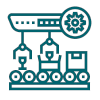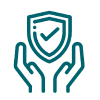Machine Learning for process monitoring and optimization!
Are you wondering about your process data?
- How can I better understand my process?
- How can I optimize my process?
- What are the critical parameters of my process?
- How to ensure the quality of raw materials?
- How to detect non-compliant products during and at the end of production?
- How many samples / batches are needed for a robust model?
- What Machine Learning methods can help me supervise my process?
- What is Industry 4.0 and how to implement it?
When we are confronted with data from the process, various questions arise on how to use it, to extract all the relevant information in order to best supervise the production lines to avoid drifts and non-conformities.
Process monitoring is part of Ondalys’ expertise. We carry out feasibility studies to help you find the best configuration for your problem.
Active member of the Axel’One collaborative innovation platform, Ondalys has in-depth knowledge of process supervision, process optimization (QbD / DOE) through pilot tests and to the implementation of models online.
You want to:

Develop
rapid at-line, in-line or on-line analysis methods for product characterization

Pilot
and optimize continuous manufacturing processes or batch production processes

Control
product quality at each stage of the production chain, comparing to standards

Process supervision
In digital industries, the main actors have a need for quality and cost optimization of their processes. To achieve this, they have large masses of data from different sensors spread on the production lines.
To make the best use of this data flow, Ondalys helps you supervise your processes using Machine Learning methods that will allow you to extract as much relevant information as possible.
For continuous process control, MSPC (Multivariate Statistical Process Control) is a very powerful tool – thanks to multivariate control charts – potential drifts are detected at a glance efficiently. Unlike the univariate control charts from SPC (Statistical Process control), they make it possible to analyze and pilot the processes in real time, by synthesizing the information and interactions of all the sensors and multivariate signals of the production.
BSPC (Batch Statistical Process Control) is specific to the analysis of batch processes. For this type of data, processing is more complex because of the additional dimension of time and the evolution of the state of the process during this time (batch kinetics).

Using process data, several objectives can be achieved:
- Design of experiments for process optimization
- Models for predicting product quality from process data
- Diagnosis of process drift
- Combination of process parameters and product measurements to optimize process supervision
- Supervision of continuous processes by Multivariate Statistical Process Control (MSPC)
- Batch process supervision by Batch Statistical Process Control (BSPC)
- Implementation of QbD / PAT (Quality-by-Design and Process Analytical Technology) in the pharmaceutical industry
Software implementation
We develop Data Mining models for process understanding with all Chemometrics and Machine Learning software on the market (Unscrambler®, SOLO® or PLS_Toolbox® in the MATLAB® environment, SIMCA®, SPM®, etc…) but also with free software (R, Python, …).
We develop MSPC and BSPC models using some software on the market (Unscrambler®, SOLO® or PLS_Toolbox® in the MATLAB® environment, SIMCA®, etc.), which allow these methods to be deployed routinely on production lines using multivariate supervision software (Unscrambler® Process Pulse, SOLO® Predictor, SIMCA®online, SynTQ or SmartFactory Rx Analytics & Control).
Our expertise at the service of data analysis
With more than 20 years of experience in data analysis (Chemometrics and Machine Learning), in particular applied to measurements from processes, the experts of our teams support you at each stage of your projects.
They talk about us
« Chemometrics allows to summarize the variables and make simpler and interpretable »




